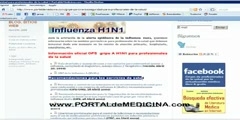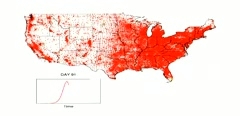Lec 20- Pandemic Influenza
"Lec 20- Pandemic InfluenzaEpidemics in Western Society Since 1600 (HIST 234) Reliable records of influenza, dating back to the 1700s, suggest a pattern of one major pandemic every century. Among the pandemics for which there is solid documentary evidence, the outbreak of 1918-1920 is by far the greatest. The so-called Spanish Lady caused somewhere between 25 and 100 million deaths worldwide. It is distinctive both for its high mortality rate, in comparison to other flu pandemics, and for its unusual demographic effect: whereas the flu typically targets the very young and old, the 1918-1920 epidemic struck adults in the prime of life. Without a cure for the disease, public health authorities today are in a position to learn from the successes and failures of the early-twentieth-century response. 00:00 - Chapter 1. Influenza 05:17 - Chapter 2. Transmission 09:06 - Chapter 3. 1889-90 Pandemic 24:00 - Chapter 4. Spanish Influenza 38:09 - Chapter 5. Epidemiology and Responses Complete course materials are available at the Open Yale Courses website: http://open.yale.edu/courses This course was recorded in Spring 2010.
Video is embedded from external source so embedding is not available.
Video is embedded from external source so download is not available.
Channels: Sociology
Tags: Lec 20- Pandemic Influenza
Uploaded by: yaleepidemicswso ( Send Message ) on 13-09-2012.
Duration: 50m 54s
Here is the next lecture for this course
Swine Flu, How the Influenza Virus Spreads
50:30 | 13274 viewsInfluenza H1N1 (Swine Flu) Updates TV Int ...
13:53 | 4870 viewsLec 7 - Influenza Viruses and Pandemics
01:49:39 | 4271 viewsAttacking influenza: how human monoclonal ...
01:58 | 15530 viewsHow influenza spreads
01:13 | 9173 viewsInfluenza A H1N1 bioseguridad para medicos
04:30 | 8263 viewsTexas Tech University April 30 Update on ...
02:27 | 6887 viewsUnderstanding Swine Flu (Influenza A H1N1 ...
08:01 | 8900 viewsInfluenza H1N1 Animated Model
00:07 | 4932 viewsSwine flu or pandemic flu simulation model
00:30 | 5632 viewsSpread of influenza
01:12 | 2779 viewsThe Influenza Virus
02:08 | 8640 viewsInfluenza
05:29 | 8468 viewsSwine Flu- Closed Captioned
05:26 | 16667 viewsProfessor Graham Brown on the outbreak of ...
07:57 | 7079 viewsNo content is added to this lecture.
This video is a part of a lecture series from of Yale
Lecture list for this course
Lec 1 - Introduction to the Course - Epidemics in Western Society
Lec 2- Classical Views of Disease: Hippocrates, Galen, and Humoralism
Lec 3 -Plague (I): Pestilence as Disease
Lec 4 - Plague (II): Responses and Measures
Lec 5 - Plague (III): Illustrations and Conclusions
Lec 6 - Smallpox (I): 'The Speckled Monster'
Lec 7 -Smallpox (II): Jenner, Vaccination, and Eradication
Lec 8 - Nineteenth-Century Medicine: The Paris School of Medicine
Lec 9 - Asiatic Cholera (I): Personal Reflections
Lec 10 -Asiatic Cholera (II): Five Pandemics
Lec 11- The Sanitary Movement and the 'Filth Theory of Disease'
Lec 13 - Contagionism versus Anticontagionsim
Lec 14 -Tropical Medicine as a Discipline
Lec 15 - The Germ Theory of Disease
Lec 16 - Malaria (I): The Case of Italy
Lec 17- Malaria (II): The Global Challenge
Lec 18- Tuberculosis (I): The Era of Consumption
Lec 19- Tuberculosis (II): After Robert Koch
Lec 21- The Tuskegee Experiment
Lec 24 -Poliomyelitis: Problems of Eradication
Lec 25 -SARS, Avian Inluenza, and Swine Flu: Lessons and Prospects
















